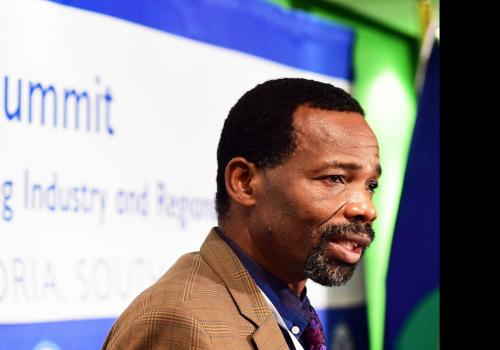Around 48 million adults, 22 million of them women, in the Southern African Development Community (SADC) Region have been included in the formal financial system over the last decade, Mr Sadwick Mtonakutha, the Director Finance, Investment and Customs Directorate in SADC Secretariat, has said.
Speaking at the annual SADC Regional Financial Inclusion Forum held in Johannesburg, South Africa, on 12th and 13th October 2022 and attended by senior-level representatives who work on financial inclusion within the Ministries of Finance, Central Banks, Non-bank Regulators and the private sector, Mr Mtonakutha outlined the progress made on financial inclusion in the Region.
This includes the 50% reduction in the cost of outbound remittances from South Africa, with more than 4.4 million adults in the Region benefiting from lower remittance prices; and the introduction of a risk-based approach to anti-money laundering which has led to an increase in access to formal remittances and migrant financial inclusion, especially from South Africa to the rest of the SADC Region. In addition, the SADC mobile money guidelines were adopted by the Committee of Central Bank Governors (CCBG) and Ministers of Finance and Investment, with Malawi and Lesotho now paying interest on mobile money wallets.
Mr Mtonakutha said the Support to Improving the Investment and the Business Environment in the SADC Region (SIBE) Programme, which is supported by the European Union, has also played a huge role in supporting financial inclusion. Key milestones achieved through the SIBE Programme include the review of the SADC strategy on financial inclusion and small and medium enterprise (SME) access to finance for the period 2016 – 2021; identification of priorities and development of timelines for harmonisation of financial inclusion; and the development of policy frameworks and guidelines for consumer protection in line with international best practices.
The SADC Secretariat is currently assisting Member States in reviewing and developing their new financial inclusion strategies. Currently, support is being provided to Angola, Botswana, Lesotho, Eswatini, Malawi and Namibia; and provision of support to Member States interested in the domestication of the SADC mobile money guidelines and FinScope surveys.
Mr Mtonakutha said gender remains an important agenda in the SADC Region. The SADC-German programme, through development agency GIZ, on industrialisation and women’s economic empowerment is supporting progress in women’s financial inclusion and has achieved the development and implementation of a gender action plan, guidelines for SADC strategy on financial inclusion and SME access to finance.
Dr Jesimen Chipika, Deputy Governor at the Reserve Bank of Zimbabwe, said financial inclusion is a priority policy initiative across Africa and the SADC Region, with the goal of achieving national development aspirations and at least 11 of the 17 SDGs, and that most governments across the region have now embedded financial inclusion within their national development policies.
SADC is at the forefront of driving financial inclusion by providing support to Member States in developing and executing their financial inclusion strategies, and convening regular platforms for stakeholders to share experiences, best practices, and progress on the state of financial inclusion. Dr Chipika said while COVID-19 negatively impacted key objectives, the restrictions led to unprecedented gains in financial innovation and created new opportunities for the adoption of digital financial services, which are now key enablers to access and usage of financial services.
The Regional Financial Inclusion Forum was established after recognition of the importance of financial inclusion for inclusive and sustainable economic growth by the SADC Council of Ministers. The Forum facilitates the regular exchange of experiences and learning among all relevant stakeholders. Its aims are to promote financial inclusion in the SADC Region for purposes of inclusive growth and poverty reduction; take stock of the various policy initiatives at country-level which promote financial inclusion and impact the livelihoods of the most vulnerable sections of the population; and share experiences and promote discussion among Member States, public- and private sector stakeholders.

